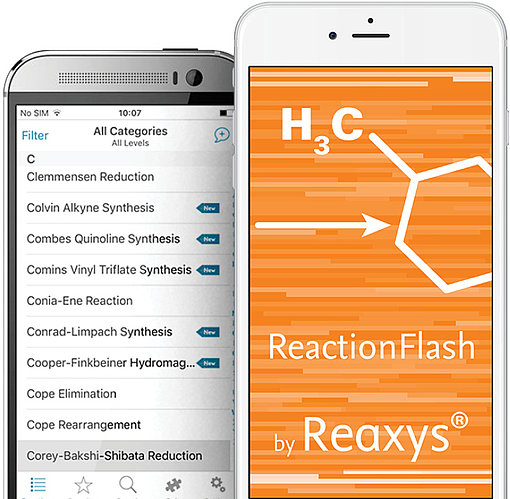ReactionFlash and apoc: Chemische Namensreaktionen spielerisch lernen
News
Wie einfach man sich dieses synthetische Grundwissen erarbeiten kann, zeigt ein <link https: bcove.video _blank external link in new>Video.
Wer organische Synthesen selbst entwickeln will, muss das Repertoire der organischen Namensreaktionen kennen und beherrschen, um auch komplexe Reaktionswege darstellen zu können.
Voraussetzung dafür ist, dass man all diese Namensreaktionen und damit die Möglichkeiten der Synthese auswendig lernt – das Lernen ist entsprechend mühsam. Mit der ReactionFlash, einer kostenlosen App für iOS und Android, wird das Lernen von 550 Namensreaktionen zum Spiel, mit einem Flash Card Quiz wie am Spielautomat.
ReactionFlash wird von Elsevier zur Verfügung gestellt und wurde im Arbeitskreis von Prof. Erick Carreira (ETH Zürich, LOC) mitentwickelt.
Erfahren Sie <link https: reaxyschem.elsevier.com reactionflash-app-23f7-54172.html _blank external link in new>hier mehr über ReactionFlash. Ein Interview mit Erick Carreira finden Sie <link https: reaxyschem.elsevier.com>hier, einen Blogbeitrag über die App <link https: www.elsevier.com connect flash-card-app-for-chemistry-gamifies-learning>hier.
<link https: itunes.apple.com ch app reactionflash _blank external link in new>Download ReactionFlash in the Apple Store
<link https: play.google.com store apps _blank external link in new>Download ReactionFlash in the Google Play Store
Ein Doktorand im Arbeitskreis von Prof. Erick Carreira, Niels Sievertsen, hat eine weitere App für das Lernen organischer Namensreaktionen entwickelt: die App "apoc social – Problems in Organic Chemistry".
Erfahren Sie <link file:67>mehr über apoc social (Seite 7).
<link https: itunes.apple.com us app apoc-social-problems-in-organic-chemistry id1180554411 _blank external link in new>Download apoc social in the Apple Store
<link https: play.google.com store apps _blank external link in new>Download apoc social in the Google Play Store
| Veröffentlicht am: |
|---|
